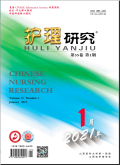护理研究2024,Vol.38Issue(14):2459-2467,9.DOI:10.12102/j.issn.1009-6493.2024.14.003
基于机器学习算法预测早期结直肠腺癌病人内镜治疗后的癌症特异性生存状态
Prediction of cancer-specific survival status of patients with early colorectal adenocarcinoma after endoscopic therapy based on machine learning algorithms
摘要
Abstract
Objective:To construct a cancer-specific survival status prediction model for patients with early colorectal adenocarcinoma after endoscopic treatment used machine learning algorithms.Methods:Based on SEER database,the data of 1 786 patients with early colorectal adenocarcinoma after endoscopic treatment were obtained,and the information included age,sex,race,cancer primary site,degree of cancer cell differentiation,pathological type of cancer tissue,radiotherapy,chemotherapy,tumor size,pathological condition,and marital status were extracted.After univariate Logistic regression and multivariate Logistic regression analysis,independent influencing factors of survival prognosis of patients with early colorectal adenocarcinoma after endoscopic treatment were determined.The patients were divided into training set and test set at a ratio of 8∶2.the factors with statistical differences in regression analysis were substituted into Logistic regression,random forest,extreme gradient boosting,support vector machine,decision tree,gradient boosting decision tree which were constructed by machine learning algorithm.To interpret results based on optimal machine learning models.Results:The results of multivariate Logistic regression showed that age,cancer primary site,degree of cancer cell differentiation,tumor size,pathological condition,and marital status were independent influencing factors of survival prognosis of patients with early colorectal adenocarcinoma after endoscopic treatment(P<0.05).The area under the curve of receiver operator characteristic of random forest in the training set and test set were 0.876 and 0.858,respectively.And the F1 score were 0.791 and 0.739,respectively.The interpretability analysis of the model based on random forest showed that age,marital status and tumor size were more important,while higher age,larger tumor diameter,poor differentiation,and existence of submucosal infiltration were risk factors for death,and married were protective factors.Patients with the primary site of cancer in the right colon had poorer survival compared to those with the primary site of cancer in the left colon.Conclusions:The prognostic model constructed by machine learning for patients with colorectal cancer has good performance.It can provide accurate individualized prediction.关键词
机器学习/早期结直肠癌/腺癌/内镜治疗/生存状态/预测模型/影响因素/护理Key words
machine learning/early colorectal cancer/adenocarcinoma/endoscopic therapy/survival state/predictive models/influencing factor/nursing引用本文复制引用
李志宏,蔡迎彬,王岩,樊华,伊丽米奴尔∙阿合买,李紫梅..基于机器学习算法预测早期结直肠腺癌病人内镜治疗后的癌症特异性生存状态[J].护理研究,2024,38(14):2459-2467,9.基金项目
新疆维吾尔自治区自然科学基金资助项目,编号:2022D01C299 ()

